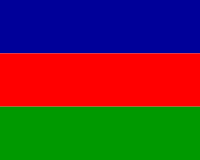National Council for the Defense of Democracy
National Council for the Defense of Democracy Conseil National Pour la Défense de la Démocratie | |
|---|---|
| President | Léonard Nyangoma |
| Founded | 24 September 1994 |
| Ideology | Hutu interests |
| Colors | Blue, Red, Green |
| Anthem | |
| Senate | 0 / 43
|
| National Assembly | 0 / 123
|
| Party flag | |
 | |
The National Council for the Defense of Democracy (Template:Lang-fr, CNDD) is a political party in Burundi.
History
The CNDD was established in Zaire on 24 September 1994 and was initially led by Léonard Nyangoma.[2][3] The party also established an armed wing, the Forces for the Defence of Democracy, which was involved in the country's ethnic conflict. In the early 2000s the party split, with a faction led by Pierre Nkurunziza becoming the National Council for the Defense of Democracy – Forces for the Defense of Democracy (CNDD–FDD). The CNDD held two ministerial posts in a unity government formed in 2001.[3]
In the 2005 parliamentary elections on 4 July the party received 4% of the vote, winning four of the 118 seats in the National Assembly, whilst the CNDD–FDD won 64.[4] It had performed strongly in local elections in June in Bururi, Nyangoma's home province,[5] receiving 4.2% of the national vote and winning 135 of the 3,225 local council seats across the country.[6] It subsequently won a single seat in the indirect Senate elections on 29 July, which was elected by colleges of local councillors,[7] and gained an additional two co-opted seats.[8] However, Nyangoma went into exile the following year, before returning in 2007.
On 1 June 2010 the party was one of several that withdrew from the presidential elections scheduled for 28 June, accusing the Independent National Elections Commission of incompetence and a lack of impartiality.[9] Following the elections, Nyangoma went into exile again, fearing that his parliamentary immunity would be lifted.[9] The CNDD did not participate in the parliamentary elections on 23 July 2010.[10]
References
- ^ http://www.cndd-burundi.com/le-parti/devise-embleme-hymne
- ^ Tom Lansford (2014) Political Handbook of the World 2014 , CQ Press, p211
- ^ a b Party history CNDD (in French)
- ^ Elections in Burundi Elections in Africa
- ^ Lansford, p214
- ^ Burundi: 2005 Communal election results Archived 2014-01-05 at the Wayback Machine EISA
- ^ Burundi Sénat (Senate): Elections held in 2005 IPU
- ^ Indirect Legislative Elections in Sub-Saharan Africa African Elections Database
- ^ a b Burundi: From electoral boycott to political impasse Archived 2014-06-26 at the Wayback Machine International Crisis Group
- ^ Burundi Inama Nshingamateka (National Assembly): Elections held in 2010 IPU
